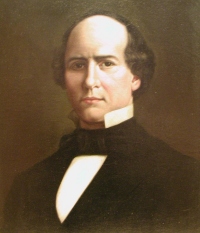The muffled drum's sad roll has beat
The soldier's last tattoo;
No more on Life's parade shall meet
That brave and fallen few.
On fame's eternal camping ground
Their silent tents to spread,
And glory guards, with solemn round
The bivouac of the dead.
No rumor of the foe's advance
Now swells upon the wind;
No troubled thought at midnight haunts
Of loved ones left behind;
No vision of the morrow's strife
The warrior's dream alarms;
No braying horn nor screaming fife
At dawn shall call to arms.
Their shivered swords are red with rust,
Their plumèd heads are bowed;
Their haughty banner, trailed in dust,
Is now their martial shroud.
And plenteous funeral tears have washed
The red stains from each brow,
And the proud forms, by battle gashed,
Are free from anguish now.
The neighing troop, the flashing blade,
The bugle's stirring blast,
The charge, the dreadful cannonade,
The din and shout, are past;
Nor war's wild note nor glory's peal
Shall thrill with fierce delight
Those breasts that nevermore may feel
The rapture of the fight.
Like the fierce northern hurricane
That sweeps his great plateau,
Flushed with the triumph yet to gain,
Came down the serried foe.
Who heard the thunder of the fray
Break o'er the field beneath,
Knew well the watchword of that day
Was "Victory or Death."
Long had the doubtful conflict raged
O'er all that stricken plain,
For never fiercer fight had waged
The vengeful blood of Spain;
And still the storm of battle blew,
Still swelled the gory tide;
Not long, our stout old chieftain knew,
Such odds his strength could bide.
'T was in that hour his stern command
Called to a martyr's grave
The flower of his beloved land,
The nation's flag to save.
By rivers of their fathers' gore
His first-born laurels grew,
And well he deemed the sons would pour
Their lives for glory too.
Full many a norther's breath has swept
O'er Angostura's plain,
And long the pitying sky has wept
Above its mouldered slain.
The raven's scream, or eagle's flight,
Or shepherd's pensive lay,
Alone awakes each sullen height
That frowned o'er that dread fray.
Sons of the Dark and Bloody Ground,
Ye must not slumber there,
Where stranger steps and tongues resound
Along the heedless air.
Your own proud land's heroic soil
Shall be your fitter grave:
She claims from war his richest spoil—
The ashes of her brave.
Thus 'neath their parent turf they rest
Far from the gory field,
Borne to a Spartan mother's breast
On many a bloody shield;
The sunshine of their native sky
Smiles sadly on them here,
And kindred eyes and hearts watch by
The heroes' sepulchre.
Rest on, embalmed and sainted dead!
Dear as the blood ye gave;
No impious footstep here shall tread
The herbage of your grave;
Nor shall your glory be forgot
While Fame her record keeps,
Or Honor points the hallowed spot
Where Valor proudly sleeps.
Yon marble minstrel's voiceless stone
In deathless song shall tell,
When many a vanished age hath flown,
The story how ye fell;
Nor wreck, nor change, nor winter's blight,
Nor Time's remorseless doom,
Shall dim one ray of glory's light
That gilds your deathless tomb.
About Colonel Theodore O'Hara

Written in 1847, O'Hara's poem The Bivouac of the Dead was composed to honor American dead at the Battle of Buena Vista, fought during the War with Mexico. Born in Danville, Kentucky in 1820, Theodore O'Hara served as captain and assistant quartermaster with the Kentucky volunteers during that war and later volunteered to lead a contingent of Kentucky soldiers during the 1850 expedition to free Cuba, where he was severely wounded. While he recuperated, he became involved in journalism and edited a newspaper in Louisville. Military life still beckoned and he joined the US Army in 1855, serving for a year with the 2nd US Cavalry.
In 1856, O'Hara moved to Mobile, Alabama, where he became editor of the Mobile Register until the outbreak of the Civil War. He raised the "Mobile Light Dragoons" in the city and was elected company captain, before joining the 12th Alabama Volunteer Infantry where he rose to the rank of lieutenant colonel. He later served on the staff of General Albert Sidney Johnston and General John Breckenridge. After the war, O'Hara became a merchant in the cotton business until wiped out by a devastating fire. He retired to a friend's plantation in Alabama where he died in 1873 from malaria. The following year, his remains were re-interred in the cemetery in Frankfort, Kentucky.